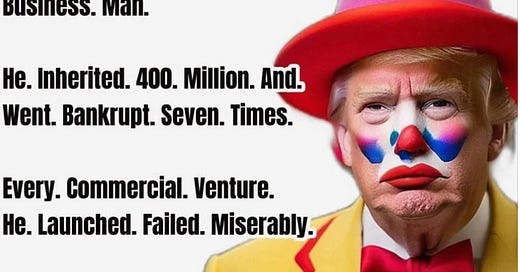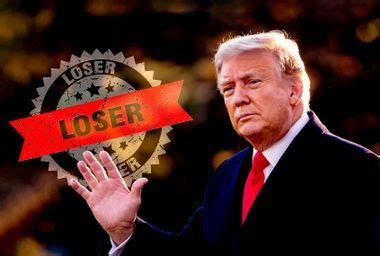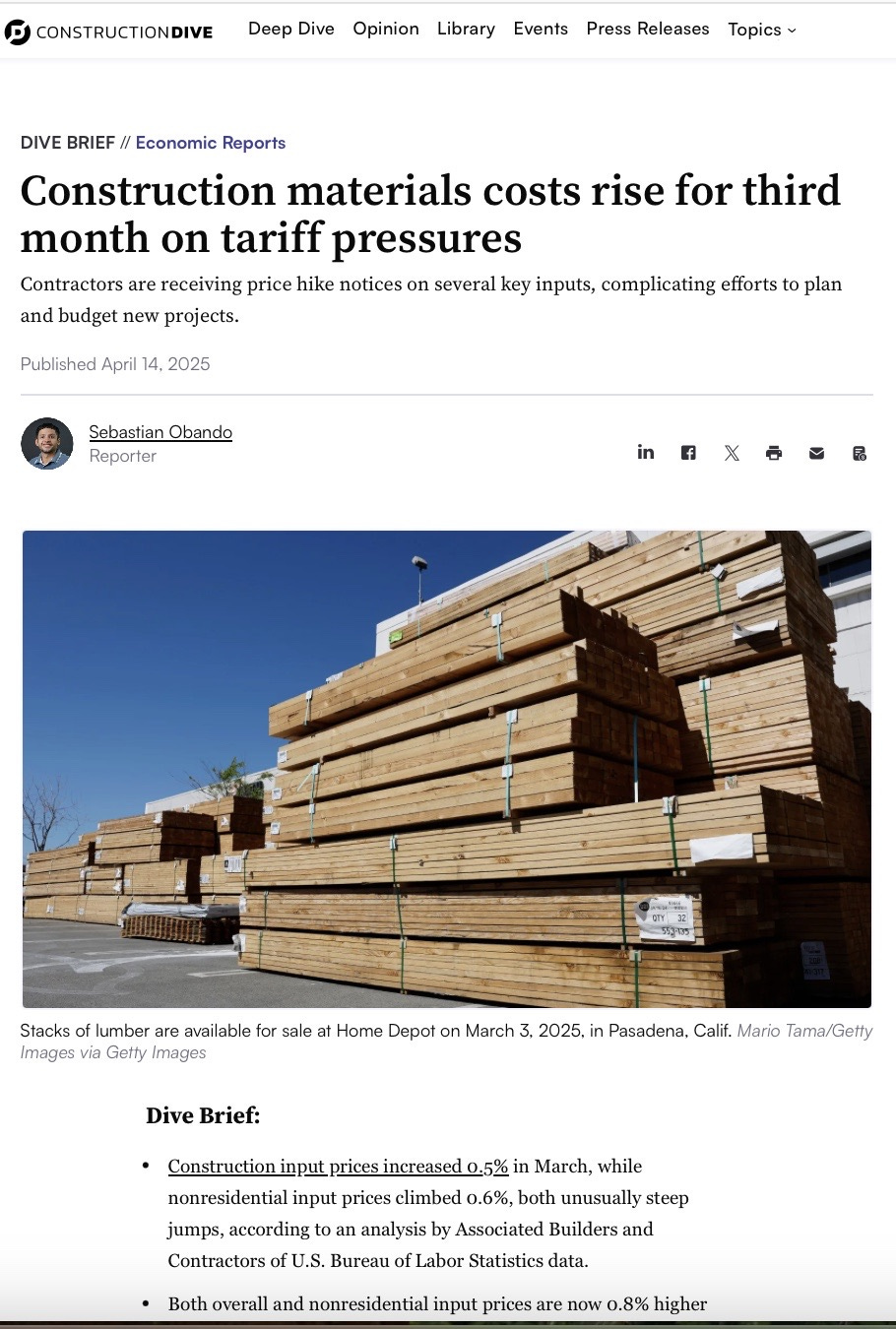It was a woman I hadn’t seen since January, a Trump supporter. More like "Trump fanatic." There was a certain edge to her voice, the kind that a person has when they can’t wait to tell you how right they think they are and how wrong they thought you were.
"So how ya likin’ Trump now?” she asked me.
“Not at all,” I said.
Really? She couldn’t believe it. “You still don’t think he’s a good businessman?” she asked. Then she started rattling off all this stuff about tariffs and government firings and that rancid talking point about countries supposedly ripping us off. I had neither the time nor the inclination to explain the economic implications of what Trump has been doing. She’s a nice lady, we’re totally friendly, but you walk away from that wondering how anyone can think this guy is a good businessman, let alone understand how a global economy works.
This comes on the heels of his hinting that he might fire Jerome Powell, the head of the Federal Reserve. Powell recently told attendees at the Economic Club of Chicago that Trump’s tariffs could result in higher prices and a slower economy—the kinds of things that bring us closer to a recession. Naturally, Trump didn't take it well. As usual, he felt personally attacked, which led to him floating the idea of removing Powell from his post.
Set aside, for a moment, that Powell’s job is independent, and the actions of the Federal Reserve are designed to be free from political interference, something Trump has consistently undermined across nearly every institution he touches.
But here’s the thing, and I have to wonder if somebody in the White House has ever explained this to him unless they’re afraid to: Powell doesn't decide on his own what to do with rates. He works with something called the Federal Open Market Committee, a group of governors who set monetary policy collectively.
Legally (not that Trump gives a damn about the law), a president cannot fire the head of the Federal Reserve or any Fed governor. He can only remove them for cause, such as misconduct or incapacity, but not simply for policy disagreements. That’s it. No president has ever done it. Powell could step aside if pressured, or he could sue to keep his job, which would plunge us into complex, untested legal territory.
But none of this matters to Trump. It's not Powell's fault that Trump started a global trade war. The Fed didn’t impose tariffs on China, Europe, or Mexico, or Canada. But it’s the Fed that has to clean up the mess. Tariffs drive up costs. That’s just Economics 101. Higher prices mean consumers have less to spend. Retaliatory tariffs hit U.S. exports, which puts added pressure on American industries and weakens investor confidence. Stagflation—the combination of slow growth with rising prices and higher inflation—isn’t just possible now. It’s starting to feel probable.
Ya know, before Trump kicked off his global slap-fight over trade, we were on a path to interest rate decreases for all the right reasons. But now? He’s tanking markets, jacking up uncertainty, and hoping that lower interest rates will cause overstretched consumers to spend money they don’t have. What he doesn’t understand—or won’t admit—is that higher tariffs are taxes. And those taxes ultimately hit the American consumer right in the wallet. The more the consumer pays, the lower the consumer confidence, because they have less disposable income.
Meanwhile, businesses don’t know what to expect. With tariffs shifting week to week, CEOs can’t make long-term plans. So they wait. And wait. Which slows growth even more.
And while we spin in place, the rest of the world is adapting, figuring out how to get along without America. The European Union is actively building new trade ties. China is negotiating with Vietnam and others. Ya think they’re not gonna do that with other countries? Ya think other countries might wanna tap into that market? China’s got over a billion people. That’s a lotta consumers. All nations are finding ways to increase trade with each other.
The United States has four percent of the world's population and 13 percent of its GDP. It wasn’t always that way, but sorry to break the bad news, we're not living in a post-WWII world anymore when the United States produced 50 percent of the world's GDP. If you think we’re gonna go back to that kind of world, if that’s your idea of Make America Great Again, you are dreaming. It ain't never gonna happen. We are not the only kid on the block anymore, so suck it up, buttercup. It’s a different world now.
Powell surely knows this. Does Trump? Do his voters? It sure doesn’t look like it.
It’s no secret that a majority of MAGA voters voted for Trump because they saw him as a businessman, and they wanted a CEO-type in the Oval Office. That’s a funny thing to think about, given the recent poll finding that more than 60 percent of the nation’s CEOs now think a recession is likely in the next six months.
Yet, you still hear it: He’s a great businessman. You hear that over and over again from people who know little or nothing at all about economics. Just like that woman, parroting talking points from cheerleader cable shows about “foreign countries ripping us off.” Never mind that for the last 75 years, with plenty of tariffs imposed on the United States, America has remained the largest, most powerful economy on the planet. How is America getting ripped off?
There is a fundamental difference between business and governance. A successful CEO might excel in running a company, but governing a country requires an entirely different skill set—one based on diplomacy, a respect for the rule of law, long-term strategic thinking, a capacity for compromise, and the ability to bring together diverse constituencies for the common good. Trump has none of these strengths. He never has.
By threatening Fed chair Jerome Powell, Trump is injecting even more chaos into financial markets. Investors are already skittish from the trade wars and policy swings. Now, they have to worry that even the Fed—the one body that’s supposed to stay above the fray—is at risk of becoming politicized.
And over what? Interest rates. A technical issue that Trump has somehow turned into another episode of the “Trump Show,” complete with ineptitude, insecurity, and the usual crybaby tantrums when things don’t go his way.
The myth of Trump the businessman is one of the greatest con jobs in American political history, bought hook, line, and sinker, especially by those who aren't fully informed about how businesses and the global economy actually function.
People latch onto the idea that someone who’s made millions (or billions, depending on the story), or had a reality TV show, is automatically qualified to run the country, despite the fact his business record is not only far from impressive; it’s a disaster zone, one of near-constant failure, mismanagement, and opportunism. His business “successes” are built on bankruptcies, fraud, lawsuits, and a knack for bullshit, not on genuine innovation, financial prudence, or any of the skills we associate with real business leaders. He didn’t build a brand; he sold one. Big difference.
Ask anyone in finance: Filing for bankruptcy six times, stiffing contractors, losing a casino, defrauding students with Trump University—these are not signs of a brilliant executive. They’re red flags. No board would hire someone with that kind of résumé.
And let’s not forget his behavior. No real CEO posts childish rants on social media, picks fights with news organizations over coverage that hurts their feelings, or undermines their own advisors daily. The best business leaders stay quiet for a reason—they know markets hate chaos. Trump, on the other hand, thrives on it. If you really had such a desperate need for attention—and he does—isn’t there a better way to do it?
So why do people continue to buy into this myth? Maybe because it was marketed so effectively. Perhaps people want to believe in something simple: that a “tough CEO” can fix a broken system. At some point, you ask yourself, as more time passes, whether more of his decisions and actions will be scrutinized by the average voter, especially by his supporters, so that the myth can finally unravel, just like his business ventures have.
America doesn’t need a childish, petulant incompetent. It needs a leader—someone who respects institutions, listens to people smarter than themselves, and can actually govern. Trump is none of those things. And deep down, maybe, just maybe, the people who need to realize it are finally starting to see through the circus act.
A few months ago, a construction project manager told me he was voting for Trump “because he’s a businessman.”
I wonder how his construction business is doing now.






